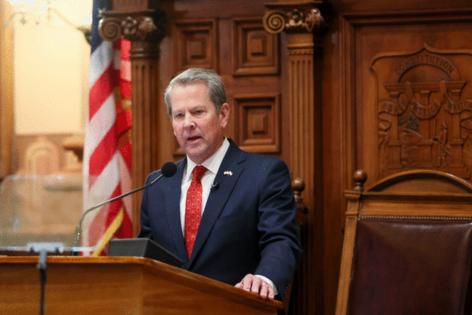Bill to limit lawsuits against crop chemical makers heads to Gov. Kemp
Published in Business News
Georgia Gov. Brian Kemp will have the final say over a proposal to shield manufacturers of crop chemicals from liability for failing to warn consumers of health risks, after the bill passed both chambers of the state Legislature.
Kemp weighs his decision amid mounting financial pressure on companies like Monsanto parent Bayer, maker of the weed killer Roundup, which was recently slapped with a $2.1 billion verdict by a Georgia jury in a suit brought by a man who said the product caused his cancer. Monsanto issued a statement denouncing the verdict and vowing to appeal.
A spokesman for Kemp did not offer any indication as to how the governor might act, writing in an email that legislation receiving final passage from the Georgia General Assembly undergoes a thorough review process. Kemp has 40 days after the end of the legislative session to either sign or veto the bill. If he does neither, it becomes law automatically. The final day of the legislative session is April 4.
The bill passed with bipartisan support from legislators who acknowledged the intense interest the proposal provoked from constituents. The proposed legislation says that a product label approved by the U.S. Environmental Protection Agency must be considered sufficient warning of potential harm, and would apply to manufacturers of chemicals including pesticides, fertilizers and herbicides. The law would not apply if a manufacturer “knowingly withheld, concealed, misrepresented, or destroyed” relevant information on health risks to obtain approval, it says.
Speaking from the Capitol floor ahead of the vote earlier this month, Rep. Steven Meeks, R-Screven, cast the bill as a clarification that companies cannot be held liable for failure to warn above and beyond what is already required by the federal government.
“You’ve gotten thousands of emails just like I have, and you’ve been told what this bill does and does not do, but ladies and gentlemen, that’s exactly what the bill does,” Meeks said. “It just says the law is the law and the EPA is the law when it comes to the label.”
Meeks also suggested that failing to pass the bill could hurt farmers that rely on chemicals to protect their crops and boost their yields. If mainstream companies are forced to discontinue a product because of liability, it would simply open the door to cheap imports of both food and chemicals from countries with looser regulation, he said.
Lawmakers who spoke in opposition to the bill said it was being pushed by corporations — specifically Bayer — seeking to avoid responsibility for selling products that harm consumers, pointing to similar bills introduced in at least eight other states and championed by Bayer.
“This bill is not about farmers — this bill is about Bayer,” said Rep. Stacey Evans, D-Atlanta.
Evans said Bayer became liable for Monsanto’s products when it acquired the company in 2018. The first lawsuits alleging Roundup caused cancer were filed in 2016, a year after the International Agency for Research on Cancer classified glyphosate, the active ingredient, as “probably carcinogenic” to humans. The U.S. EPA, however, says that glyphosate is unlikely to be a human carcinogen.
“A lot of people got hurt; a lot of people got sick,” Evans said. “Bayer bought that liability, and now Bayer wants to ask us to take it away.”
In an emailed statement, Bayer acknowledged it was working with state lawmakers across the country to support “reliable, science-based regulation” and consistency in labeling.
“The reality is that the litigation industry has targeted Roundup, a product that has been used for more than 50 years and has been repeatedly determined as safe by leading regulators around the world,” the company said. “Since litigation against glyphosate began, Bayer has paid out roughly $10 billion from an expensed & provisioned total of $16 billion to address these cases — funds that could be invested in R&D and used toward creating new technology for farmers, consumers and patients.”
Will Bentley, president of the Georgia Agribusiness Council, which represents about 1,400 members across the state, said his organization was in favor of SB 144. He denied it was about shielding wealthy multinational corporations from responsibility for their products.
“We’re just looking for regulatory clarity for our farmers,” Bentley said. “We don’t feel like there should be a patchwork of labeling regulations across the entire country.”
Not all farmers agree.
Will Harris, the owner of White Oak Pastures in Bluffton, Georgia, wrote an impassioned plea to Gov. Kemp on Facebook urging him to veto SB 144. White Oak is known for eschewing chemicals in favor of regenerative farming that emphasizes biodiversity and soil health.
“Chemical companies and legislators are claiming that this bill is pro-farmer, because it protects farmer access to pesticides,” Harris wrote. “This claim is false — farmers deserve to have the right to sue chemical manufacturers when their land, property, or family is injured by chemicals.”
“Pesticide companies have no incentive to be honest about the risks of their products,” he added.
_____
©2025 The Atlanta Journal-Constitution. Visit at ajc.com. Distributed by Tribune Content Agency, LLC.












Comments